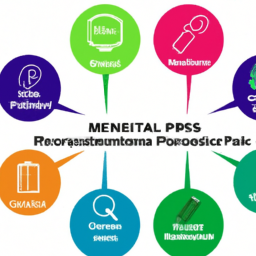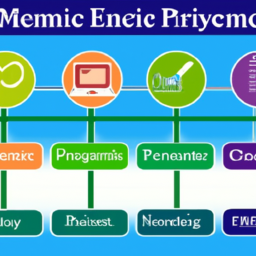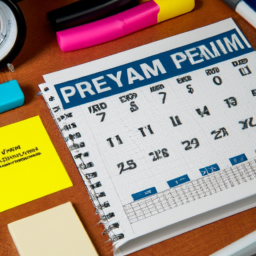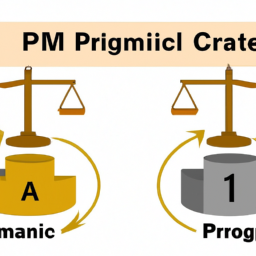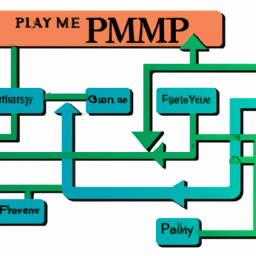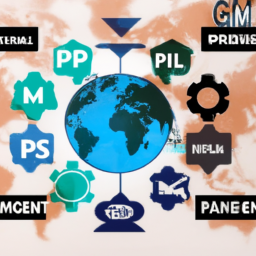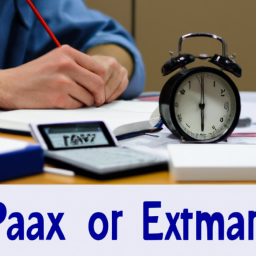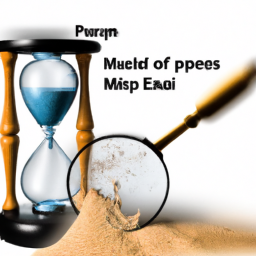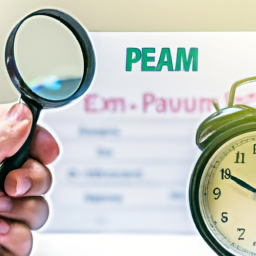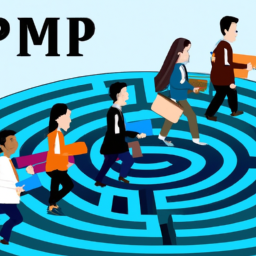Are you ready to conquer the PMP exam and take your career to new heights? Look no further, because this article is here to guide you every step of the way.
Picture yourself confidently answering each question, armed with expert tips and strategies.
With a thorough understanding of the exam requirements, a well-structured study plan, and access to effective study materials and resources, you’ll be well-equipped to tackle any challenge that comes your way.
So let’s dive in and prepare for success!
Key Takeaways
- Review eligibility criteria and gather necessary documentation for PMP exam application.
- Create a study plan with specific goals, a realistic timeline, and allocated study time.
- Use effective study materials and resources such as comprehensive study guides, online courses, and practice exams.
- Implement test-taking strategies like time management, question analysis, and analyzing performance to adjust the study plan accordingly.
Understanding the PMP Exam Requirements
To understand the PMP exam requirements, you’ll need to review the eligibility criteria and ensure you meet the necessary experience and education qualifications.
The PMP exam eligibility is determined by a combination of education and professional experience. The application process requires you to provide evidence of your educational background, such as a high school diploma or equivalent, as well as a minimum of 35 hours of project management education.
In terms of professional experience, you must have accumulated a minimum of 4,500 hours leading and directing projects if you hold a four-year degree, or 7,500 hours if you have a high school diploma or equivalent.
It is important to carefully review the eligibility criteria and gather all the necessary documentation before submitting your application. Once you have met the eligibility requirements, you can move on to creating a study plan.
Creating a Study Plan
Start by mapping out a study plan that includes specific goals and a realistic timeline for completion. Time management is crucial when preparing for the PMP exam.
Begin by determining how many hours you can dedicate to studying each day or week and allocate that time accordingly. Break down the exam content into manageable sections and assign specific study goals to each section. This will help you stay organized and focused.
In addition to studying the material, make sure to incorporate practice exams into your study plan. Taking practice exams will not only help you assess your knowledge and identify areas of improvement, but it will also familiarize you with the exam format and time constraints.
Effective Study Materials and Resources
One of the most effective study materials for the PMP exam is a comprehensive study guide. These guides provide a thorough and organized overview of the exam content, helping you understand the key concepts and topics you need to master. They often include practice questions and exercises to test your knowledge and reinforce your learning.
In addition to study guides, there are also many online resources available to help you prepare for the PMP exam. These resources include online courses, practice exams, and forums where you can interact with other PMP candidates and experts.
Utilizing both study guides and online resources will provide you with a well-rounded and comprehensive study plan, increasing your chances of passing the PMP exam.
Developing Test-Taking Strategies
Improve your chances of success on the PMP exam by developing effective test-taking strategies. Follow these key strategies to better manage your time and analyze exam questions:
-
Time Management: Time is crucial during the PMP exam. Allocate your time wisely by dividing it equally among the questions. Set a time limit for each question and stick to it. If you get stuck on a difficult question, move on and come back to it later.
-
Question Analysis: Before jumping into answering a question, take a moment to carefully read and understand it. Identify the key information and requirements. Pay attention to keywords and phrases that can guide you to the correct answer. Analyze the options, eliminate any obviously wrong choices, and make an educated guess if necessary.
-
Practice, Practice, Practice: The more you practice answering PMP exam questions, the better you will become at understanding the format and style. Utilize practice exams and sample questions to familiarize yourself with the types of questions you may encounter. Analyze your performance, identify areas for improvement, and adjust your study plan accordingly.
Managing Exam Anxiety and Stress
To effectively manage your exam anxiety and stress, it’s important to develop coping mechanisms and relaxation techniques.
One effective technique is deep breathing. Close your eyes, take a deep breath in through your nose, and exhale slowly through your mouth. Repeat this several times to help calm your nerves.
Another technique is progressive muscle relaxation. Start by tensing and then relaxing each muscle group in your body, from your toes to your head. This can help release tension and promote relaxation.
Additionally, practicing good time management can help reduce stress. Create a study schedule and stick to it, allowing yourself breaks to rest and recharge. Prioritize your tasks and focus on one thing at a time.
Frequently Asked Questions
What Are the Eligibility Requirements to Take the PMP Exam?
To take the PMP exam, you must meet certain eligibility requirements. These include having a secondary degree, such as a high school diploma or associate’s degree, along with at least 5 years of project management experience. However, if you have a four-year degree, you only need 3 years of project management experience.
Additionally, there is a time limit of 4 hours to complete the exam. Make sure you fulfill the requirements and are prepared for the exam to increase your chances of success.
Is There a Time Limit to Complete the PMP Exam?
Yes, there is a time limit to complete the PMP exam. The exam duration is 4 hours and you must manage your time wisely to answer all the questions within this timeframe.
It is important to develop effective time management strategies to ensure that you allocate enough time for each question and section of the exam. By practicing with timed mock exams and creating a study schedule, you can improve your time management skills and increase your chances of success.
How Many Questions Are There in the PMP Exam and What Is the Passing Score?
The PMP exam consists of 200 multiple-choice questions. To pass, you need to answer at least 137 of them correctly. This means you must have a success rate of 68.5%.
It’s important to note that the questions are not evenly distributed across the five process groups. To maximize your chances of success, focus on understanding the PMP exam structure and familiarize yourself with the areas that carry more weight.
Can I Use Online Resources and Study Groups to Prepare for the PMP Exam?
Yes, you can definitely use online resources and study groups to prepare for the PMP exam.
Online resources such as practice exams, study guides, and video tutorials can provide you with valuable information and help you understand the exam content better.
Study groups, on the other hand, allow you to collaborate with other PMP aspirants, exchange ideas, share study materials, and discuss challenging topics.
Utilizing these resources can enhance your preparation and increase your chances of success on the exam.
Are There Any Specific Strategies for Answering Situational and Scenario-Based Questions in the PMP Exam?
When it comes to the PMP exam, answering situational and scenario-based questions can be challenging. But don’t worry, there are specific strategies you can use to tackle them successfully.
Start by carefully reading the question and understanding the scenario provided. Then, analyze the situation, identify the problem, and consider all possible options.
Conclusion
In conclusion, you’ve learned the essential steps to prepare for the PMP exam.
By understanding the exam requirements, creating a study plan, utilizing effective study materials, developing test-taking strategies, and managing exam anxiety, you’ve set yourself up for success.
Remember, as the saying goes, ‘Failing to prepare is preparing to fail.’
So, make sure to follow these expert tips and strategies to confidently tackle the PMP exam and achieve your certification.
Good luck on your journey!


